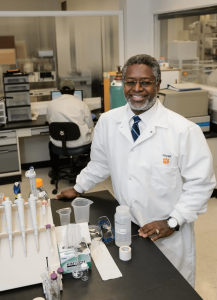Clemson University professor recognized for outstanding contributions to the chemical sciences
September 29, 2014Anthony Guiseppi-Elie’s advances include chip to monitor blood loss
CLEMSON, SC – One of the projects that helped a Clemson University professor secure a prestigious honor could allow doctors to inject chips into the muscle of trauma victims to determine whether blood loss is life-threatening.
The “biochip” is one of many innovations that Anthony Guiseppi-Elie has advanced in an accomplished career spanning nearly four decades, including eight years at Clemson.
His outstanding achievements were recently recognized by the Royal Society of Chemistry. The London-based professional society admitted him as a fellow.
“It says that Clemson researchers are amongst the best in the world,” Guiseppi-Elie said. “Ultimately, it’s not about me. I’ve had wonderful students– very productive, very smart students who have contributed to my work over the years.”
Guiseppi-Elie said he is continuing to advance the research the society cited when it made him a fellow.
The biochip Guiseppi-Elie is developing would “detect and report elevated lactate levels in trauma victims,” he said. “When a patient is bleeding, lactate levels can be four or five times higher than normal.”
Such measurements would be far better than a blood test in determining whether the patient’s life may be in jeopardy, he said.
“A lot of the chemistry that’s in the blood is in fact dictated by the chemistry in the muscles,” Guiseppi-Elie said. “We would like to find out what’s going on with a patient before the elevated chemistries appear in the blood. You have to make these measurements where the action is. The action is in the muscle.
“The chip could be injected into a patient at the scene of a traumatic injury, such as a car wreck or on the battlefield, and remain in the muscle for several weeks.”
But putting the chip in the body for an extended period presents another challenge. The body will eventually form a wall of tissue around any foreign object. The tissue would prevent the chip from taking measurements.
Guiseppi-Elie said he is also developing electroconductive gels that would coat the chip to prevent the tissue from encapsulating it.
“We borrow some of the chemistry from the human body itself, and we put that chemistry into the material that coats the chip,” he said. “That makes it compatible so that the body recognizes the chip as itself rather than something foreign.”
Guiseppi-Elie is a professor in three of Clemson’s engineering departments– chemical and biomolecular engineering; electrical and computer engineering; and bioengineering. He is also director of the Center for Bioelectronics, Biosensors, and Biochips.
“Being named fellow is a well-deserved honor,” said Doug Hirt, chair of Clemson’s Department of Chemical and Biomolecular Engineering. “It’s a prestigious recognition that goes to the society’s most accomplished members.”
Guiseppi-Elie said he is also working on a gel that can respond to the changing chemistry of a wound. The gel is designed for chronic wounds that refuse to heal, he said.
“This gel material responds by releasing a drug,” Guiseppi-Elie said.
It will be especially helpful with pressure ulcers, also known as bed sores, he said. As life spans expand, more people will spend their final few years in bed, Guiseppi-Elie said.
“This is a challenge we’ll have to face,” he said.
Anand Gramopadhye, dean of the College of Engineering and Science, said that being named a fellow of the Royal Society of Chemistry underscores the level of scholarship Dr. Guiseppi-Elie brings to Clemson.
“The work that Dr. Guiseppi-Elie is doing exemplifies the high-level of research happening in the college,” Gramopadhye said. “He has had a stellar career and still has some exciting work ahead of him. Congratulations to him.”
Being named a fellow comes on the heels of a separate award. Clemson University Libraries named Guiseppi-Elie “Researcher of the Month” in July, noting he has 136 publications and has been cited 3,526 times.
“These two distinct and significant recognitions are richly deserved,” said Tanju Karanfil, the college’s associate dean for research and graduate studies. “With work like this, we will take Clemson research to the next level.”




















